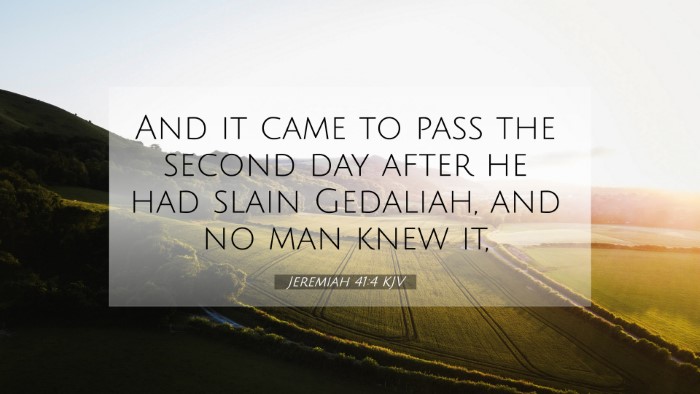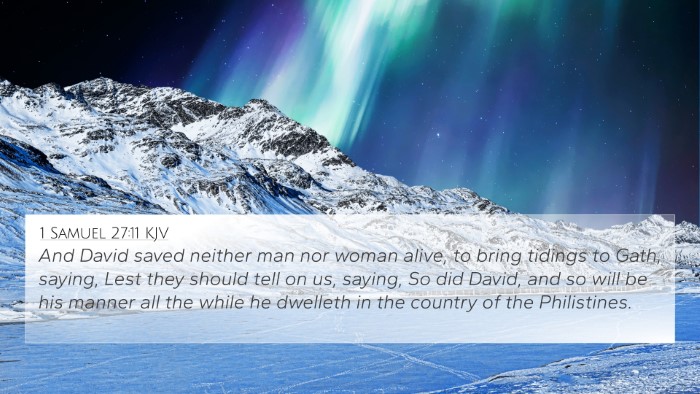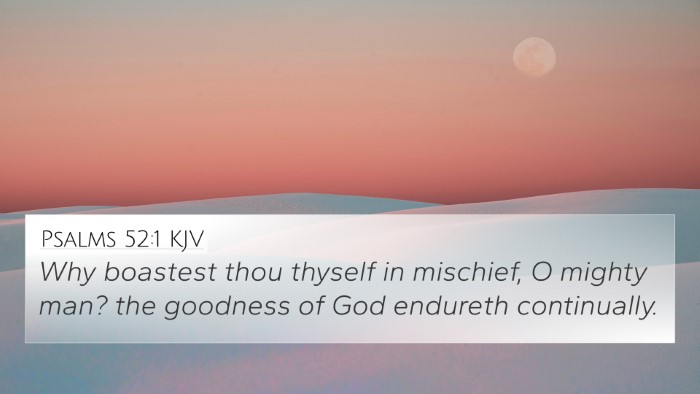Understanding Jeremiah 41:4
Jeremiah 41:4 reads: "And it came to pass on the second day after he had slain Gedaliah, and all the people that were with him, that there came certain from Shechem, from Shiloh, and from Samaria, even fourscore men, having their beards shaven, and their clothes rent, and having cut themselves, with offerings and incense in their hand, to bring them to the house of the LORD."
Context and Setting
This verse occurs in the aftermath of a significant event in Jeremiah's narrative—the assassination of Gedaliah, the appointed governor of Judah. The historical context is crucial as it sets the stage for understanding the motivations of the people involved. Gedaliah's death sparked a crisis among the remaining populace and the foreign nations connected to Israel.
Insights from Commentaries
-
Matthew Henry: Henry emphasizes the gravity of the sin of murdering Gedaliah, noting that his death was tragic and led to a chaotic state in the region. The arrival of the men from Shechem and other cities indicates an outpouring of grief and a quest for forgiveness, highlighting a desperate attempt to seek God after an act of rebellion.
-
Albert Barnes: Barnes points out that the men bringing offerings represented a customary act of penance. Their shaven beards and torn clothes symbolized mourning and repentance, showing the depth of their remorse and desire to return to the Lord, despite the tumultuous circumstances surrounding them.
-
Adam Clarke: Clarke notes the cultural practices of the time, emphasizing the significance of offerings and the appearance of those who sought God's favor. He highlights that their actions were a desperate plea for divine intervention and mercy, reflecting an understanding of covenant relationship dynamics between the people and God.
Thematic Connections
The themes of mourning, repentance, and the desire for reconciliation with God permeate this verse. It illustrates the profound sense of loss following Gedaliah's death and the urgent need for the people to approach God with sincere hearts, demonstrating the recurring Biblical theme of turning back to God after sin.
Bible Verse Cross-References
- 2 Kings 25:25: Discusses the aftermath of the Babylonian exile, linking the consequence of disobedience with national turmoil.
- Jeremiah 36:9: This verse provides context on the condition of Judah and the people’s responses during periods of prophetic warnings.
- Isaiah 58:5: Provides insight into the true nature of fasting and mourning, relatable to the men's actions in Jeremiah 41:4.
- Ezra 9:3: Connects with the themes of mourning over sin and seeking God’s favor, similar to the actions of the men in our verse.
- Joel 2:12-13: Calls the people to repentance and acknowledges the importance of genuine sorrow for sin.
- Matthew 5:4: Reinforces the concept of blessedness in mourning, a spiritual principle applicable to the context of Jeremiah.
- Luke 15:24: The Prodigal Son's return illustrates the heart of repentance and reconciliation, akin to the people’s intent in this verse.
Comparative Bible Verse Analysis
The inter-Biblical dialogue is evident when comparing the heart of repentance throughout Scripture. For instance, the ritualistic reforms initiated by King Josiah during his reign evoke a parallel to the offerings made by the men in Jeremiah's time. Both instances reflect a yearning for restoration and adherence to God’s commandments, inviting deeper exploration of the covenant relationship portrayed throughout the Old Testament.
Conclusion
Jeremiah 41:4 encapsulates a poignant moment of crisis that leads to a collective recognition of the need for reconciliation with God. Through the lens of grief, penance, and urgent appeal for mercy, this verse opens up a channel for understanding the nature of God’s relationship with His people—a theme that resonates throughout the Scriptures. By examining related verses and engaging in cross-referencing Biblical texts, one can glean profound insights into the spiritual dynamics at play during these ancient times.




